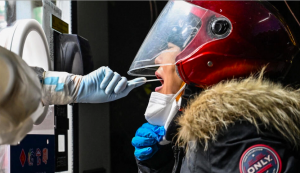The United States will require travelers from China to have negative COVID testing.
PCR screenings have been made mandatory for Chinese travelers upon arrival in a number of countries, including Japan, India, and Italy.

With the United States announcing it will demand negative Covid tests for travellers from China following its decision to stop obligatory quarantine for foreign visitors, Beijing’s abrupt pivot away from containing Covid-19 has generated unease throughout the world.
China ended some of the strictest border controls in the world late Monday by eliminating quarantine for visitors beginning on January 8. This action was the final component of the country’s tough zero-Covid policy.
Chinese citizens celebrated the decision and raced to book international flights, which led to an increase in ticket prices.
China’s hospitals and cemeteries are still being overrun by an influx of primarily old people.
In Tianjin, 140 kilometres (87 miles) southwest of the capital Beijing, overcrowded hospital emergency wards on Wednesday were home to dozens of primarily elderly Covid patients who were laying on gurneys.
Despite testing positive for the virus, doctors expect “very much all” of the medical personnel to continue working, the doctor added.
As China fights the largest increase in infection rates worldwide, other nations have raised alarm about the possibility of new varieties emerging.
According to health experts, Beijing is not sharing enough information on the spike in coronavirus cases there, therefore the United States will now need negative Covid testing from all flying travellers from China.
A federal health official announced that beginning January 5, “all air passengers two years of age and older originating from China will be required to get a test no more than two days before their departure from China, Hong Kong, and Macau, and show a negative test result to the airlines upon departure.”
For Chinese travellers, PCR testing is now available upon arrival in a number of nations, including Japan, India, and Italy.
Taiwan, a sovereign island that China claims as its own, announced on Wednesday that it will check mainland travellers for the virus.
“Predictable and in check”
China’s relaxation of restrictions effectively put an end to a zero-Covid regime of extensive testing, lockdowns, and lengthy quarantines that had stymied its economy and incited widespread demonstrations across the country.
According to Wang Wenbin, a spokeswoman for the foreign ministry, “the epidemic situation in China is now developing in a generally predictable and under control manner.”
Wang went on to say that “totally skewed” Western media coverage of China’s Covid increase “cannot stand the scrutiny of facts” and that “hyping, slander, and political manipulation with ulterior motives.”
Since March 2020, centralised quarantine has been required for all travellers entering in China. The three-week isolation period was reduced to one week in June and then to five days in December.
Covid-19 will also be reduced to a Class B infectious disease in January when that rule expires, enabling authorities to enact lighter controls.
Chinese immigration authorities announced on Tuesday that after years of stringent exit controls, they will start issuing passports for travel starting on January 8.
monitoring cases
The winter uptick occurs in advance of significant public holidays later this month, when hundreds of millions of people are anticipated to visit their hometowns to visit with family.
Chinese officials have lowered the threshold for classifying Covid deaths and said that it is now “difficult” to trace the outbreak’s scope.
Since patients are no longer obligated to report infections to the authorities, China’s Center for Disease Prevention and Control recorded 5,231 new Covid cases and three fatalities nationwide on Wednesday.
Disease control official Yin Wenwu stated at a press conference on Tuesday that authorities are using data from online surveys, hospital visits, demand for fever medications, and emergency calls to “make up for deficiencies in (officially) published information.”
Paxlovid, an oral Covid medication, will be distributed by Beijing city officials at neighbourhood hospitals and community clinics due to a lack of fundamental medications in the nation. It is still incredibly challenging for regular people to get.
The US-developed medication was temporarily offered on the delivery platform Meituan and the e-commerce platform JD.com in the most recent few days before both ran out of stock.










































